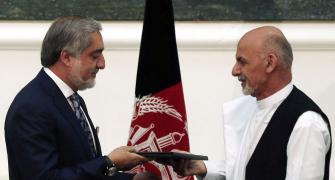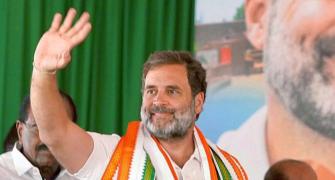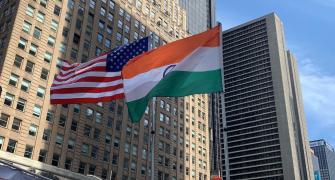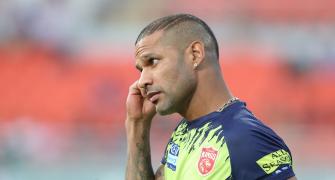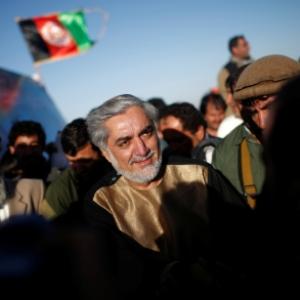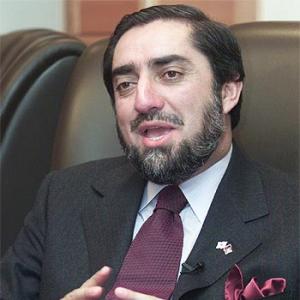 As Ashraf Ghani and Abdullah Abdullah form a joint government after contesting the presidential election against each other, Prakash Bhandari reports from Kabul on the problems facing the new, US-brokered arrangement.
As Ashraf Ghani and Abdullah Abdullah form a joint government after contesting the presidential election against each other, Prakash Bhandari reports from Kabul on the problems facing the new, US-brokered arrangement.
After months of uncertainty over Afghanistan’s presidential election, the United States successfully brokered a deal between Ashraf Ghani and Abdullah Abdullah, who contested the run-off for the presidential election in which Ghani was declared winner.
The run-off was caused because no candidate could get more than 50 percent mandatory votes in the main election for the presidency.
After three months of stalemate, in which the supporters of Abdullah alleged mass-scale fraud in the run-off election and delaying announcing the June ballot,
Ghani, a former professor at Columbia University in New York who also served as Afghanistan’s finance minister, and his opponent Abdullah, a former foreign minister, signed an agreement on a national unity government at the presidential palace.
This understanding between the two leaders is described as the end to “Noora Kushti” (wrestling bout in which the wrestlers have a prior understanding).
In July the preliminary count of the run-off election named Ghani, who also served in the World Bank and who was once a US citizen, as winner. The run-off election was conducted under the supervision of the United Nations, and the UN-supervised audit didn't disqualify enough fraudulent votes to change that outcome, members of both teams claim.
But the election commission didn't release the election's final tally. Abdullah and his allies, among them key Tajik and Hazara former warlords, have argued that the widespread fraud perpetrated during the election has made any such tally meaningless. Their threats of street protests that could split the country along ethnic lines prompted the US to intervene.
Under the new arrangement Abdullah would become the chief executive officer, akin to prime minister. Under the new scheme of things there would be parity between the two factions in appointing heads of key security and economic institutions, as well as "equitable representation" in other senior government jobs.
There is no provision for a “CEO” in Afghanistan’s constitution. But Ashraf Ghani as president could use his decree to create the position of not only CEO but also amend the statute to suitably replace it with the permanent position of executive prime minister, diluting the near-absolute powers of the president. Such amendments entail a lengthy process where the clear winner, Ghani, will not e be able to enjoy the mandate given to him.
The arrangement between Ghani and Abdullah is yet to be fully defined, but political observers feel that this would not be an easy task and would lead to destabilising the government and its administration.
"Afghanistan is going to have a most polarised government in recent history, and both Ghani and Abdullah will have to shed their original ideas to work amicably together,” said Naimullah Sangen, a political writer based in Kabul.
Both Ghani and Abdullah worked together in Hamid Karzai’s cabinet after the 2001 US invasion that ousted the Taliban, and were known to share the same ideology. Later, as adversaries, they supported a quick signing of the bilateral security agreement with the US. This agreement, however, did not get Karzai’s endorsement. The agreement needed US troops to stay in Afghanistan after the coalition’s current mandate expires in December.
Karzai has refused to sign a bilateral security agreement allowing nearly 10,000 US military advisers and counter-terrorism units to remain in Afghanistan after the withdrawal of all foreign combat troops at the end of this year. NATO allies are expected to contribute another 3,000 advisers and trainers.
Both Ghani and Abdullah sided with the warlords and power-brokers whose inability to get along after the collapse of the communist regime in 1992 pushed Afghanistan into a civil war that eventually gave rise to the Taliban. Now, under the changed scenario, Ghani will have to deal with a backlash in his ethnic Pashtun power base, where many are angered by the concessions he has been forced to make to Abdullah's Tajik and Hazara allies.
The common man in Kabul is unhappy at the way Ghani and Abdullah worked out an arrangement to share power.
“First they went to the people to seek their mandate, once the people gave it the two decided to work out an arrangement which is nothing but you scratch my back and I scratch yours. We voted, but our votes had no value. It’s a mockery of the electorate. Such things would not last but lead to disaster,” said Haroon Kundozi, a young man from Kabul.
Defending the agreement, both Ghani and Abdullah stated that they did it in the best interests of Afghanistan to prevent any bloodshed and civil war.
"The agreement is just to grab power and they have not worked out strategies on how they would share power. This agreement would see its natural death in six months,” said Abdul Samath, speaking in chaste Urdu.
The Election Commission did not declare the results, but political pundits in Afghanistan feel that after audit the final gap between the two candidates was less than three points. In the main election Abdullah polled more votes than Ghani, but in the run-off Ghani secured more votes.
The new Afghan government will have a cabinet of ministers, including the CEO and two deputies, chaired by the president who will take all strategic decisions. Day-to-day administration will be carried out by the council of ministers chaired by the CEO and including all ministers.
But the clash of ideologies would begin over appointments as Abdullah would assert himself in appointments and would put his weight behind appointing senior positions in terms of “parity” with Ghani. But the latter, who is known for reforms, would go in for merit in all key appointments.
In the past several months, the two camps have been deadlocked over the US proposal to create the post of CEO in the cabinet, similar to prime minister, to be filled by the losing candidate or his nominee. But after coming under intense pressure from Washington, the UN and EU, they agreed earlier in the week to accept the compromise proposal. Under the reported deal, the president and the chief executive will jointly nominate members of the cabinet.
The agreement is a vindication of efforts of the US that has repeatedly urged the rival camps to quickly strike a deal to bring stability to Afghanistan and prevent further inter-communal tensions.
Abdullah is backed by Tajiks and other northern minority groups, while Ghani draws much of his support from the Pashtuns, Afghanistan’s largest ethnic group.
Taliban insurgents -- estimated to number 30,000 to 35,000 fighters -- have taken advantage of the instability resulting from the long post-election wrangle, launching a series of attacks across the country that has made 2014 the bloodiest year of the 13-year conflict. The guerrillas’ political leadership dismissed the poll, claiming it would be rigged anyway, and vowed to continue fighting as long as foreign troops remain in Afghanistan.
The new president, Ashraf Ghani, will have to address the most pressing needs of security, justice, jobs and basic services and a check on corruption in administration.
Funding by donor countries helps in running Afghanistan but it has been noticed that the donors are not happy with the way their funds are being used. Unless given a clean and transparent administration they could stop funding, which would lead to economic instability in Afghanistan.
But in the country itself, the case for bipartisan support is strong. Relatively modest financial assistance will help ensure that the enormous human and financial investment in Afghanistan is not wasted, gains on the ground are secured, and the world is safer.
A stronger partnership is needed between the new government and both western and regional States, including China and Russia. Their influence is central to regional stability, as is the Americans'.
India has always maintained a very close relationship with Afghanistan, and when Hamid Karzai was invited to attend the swearing-in-ceremony of Prime Minister Narendra Modi the bondage between the two countries was further strengthened.
India is supporting Afghanistan with billions of rupees and even the new parliament building that is coming up is a gift from India. Ghani will have to strengthen ties with India even at the cost of annoying Pakistan.
Image: Afghan rival presidential candidates Abdullah Abdullah (left) and Ashraf Ghani shake hands after exchanging signed agreements for the country's unity government in Kabul on September 21, 2014. Photograph: Omar Sobhani/Reuters.

